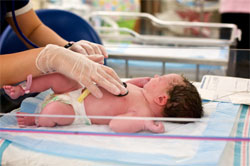
People thinking about enrolling in a neonatal clinical nurse specialist program, will be training for a profession that focuses on helping babies. Before you apply for a training program, there are a few necessary requirements you will want to take care of. If someone does not meet these specifications, they won't qualify to apply for this sort of program.
Before you apply you have to make certain you've got a Bachelor's degree with a major in nursing. This degree will need to be certified by the Nursing Accrediting Commission also known as NLNAC, or the Commission on Collegiate Nursing Education also known as the CCNE. Many schools offering these kinds of programs will likely demand a grade point average of at least 3.0.
If you get accepted into a program there's a whole lot for you to learn. In a clinical nurse specialist program you will be prepared to be an expert in the practice of neonatal nursing, as well as theory.
You'll be required to learn to establish as well as review patient care and assess and determine education needs for patient. This means you'll be learning how to begin the treatment of a patient however, you must also keep track of the care to determine if the patient is making progress. On the subject of the educational part you'll want to find out what the patients and the families of the patients need to know to help make this a successful recovery.
You'll be learning tips on how to design and implement programs plus ways to work with others and collect data. To be able to pass this phase of your training, it's going to be quite important to develop good communication skills. This is also a skill you will end up making use of on a regular basis once you are working in the field.
You will be trained to carry out changes anytime research findings require this to happen as well.
It is possible that you might discover the hospital you are applying for has different requirements. That is why, you need to make sure the school you decided on will prepare you for a position you desire. This will minimize the chance that you will need to have more training to get the job you're trying to get.
Most hospitals that you go to will require that you have a minimum of 24 months of experience working as a medical surgical nurse or an adult health nurse before you enter into the area of expertise although this isn't always the case.
When thinking about neonatal nurse clinical specialist programs you need to know that these nurses are in high demand and depending on the region in which you live could easily start off making about $30,000 - $48,000 without having any experience working in any other hospitals or facilities.








